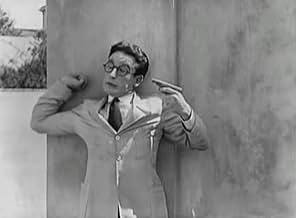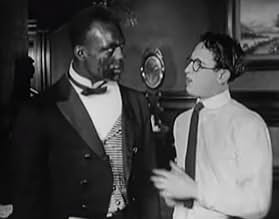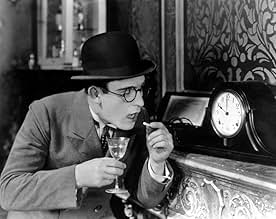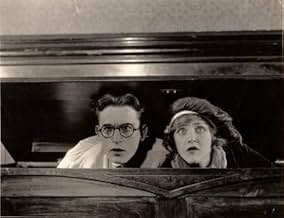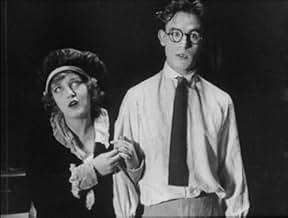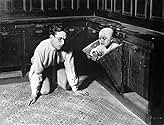Agrega una trama en tu idiomaAfter numerous failed attempts to commit suicide, our hero (Lloyd) runs into a lawyer who is looking for a stooge to stand in as a groom in order to secure an inheritance for his client (Dav... Leer todoAfter numerous failed attempts to commit suicide, our hero (Lloyd) runs into a lawyer who is looking for a stooge to stand in as a groom in order to secure an inheritance for his client (Davis). The inheritance is a house, which her scheming uncle "haunts" so that he can scare th... Leer todoAfter numerous failed attempts to commit suicide, our hero (Lloyd) runs into a lawyer who is looking for a stooge to stand in as a groom in order to secure an inheritance for his client (Davis). The inheritance is a house, which her scheming uncle "haunts" so that he can scare them off and claim the property.
- The Uncle
- (as Wallace Howe)
- Unidentified
- (sin créditos)
- Short Butler
- (sin créditos)
- Woman
- (sin créditos)
- Boy at Robbery
- (sin créditos)
- Bit Role
- (sin créditos)
- The Lawyer
- (sin créditos)
- Gardener
- (sin créditos)
- Kitchen Staff Member
- (sin créditos)
- Fat Butler
- (sin créditos)
- Undetermined Secondary Role
- (sin créditos)
- Bearded Man in Car
- (sin créditos)
- Little Boy
- (sin créditos)
- The Other Girl
- (sin créditos)
- Unidentified role
- (sin créditos)
- Bit Role
- (sin créditos)
- Dirección
- Guionista
- Todo el elenco y el equipo
- Producción, taquilla y más en IMDbPro
Opiniones destacadas
The familiar setup is Harold's determination to meet the girl of his dreams and get married, coupled with the cliche of the heiress who must live up to the conditions of a will and visit a "haunted" mansion. Count on Lloyd to make the most of every opportunity for a laugh that comes his way.
Having seen this with a modern audience, I know that people today are distressed by the portrayals of African Americans in the film. That's really too bad, because the little black kid in this film proves himself a comedian easily on a par with Lloyd himself.
In Haunted Spooks though we have a film that is ingenious, hilarious and inspired.
From a wonderful introduction to Harold (he's in frame a good 30 seconds before you see him, a truly brilliant reveal) the invention never lets up. The film could easily have sustained 4 reels or more, there is so much going on.
The highlight is a hilarious sequence where Harold, left suicidal by yet another rejection, tries to find ways to do the deed. The result of one attempt involving drowning is priceless and as funny a gag as Lloyd ever produced. Another involving the typical self-absorbed nature of people as a man pauses him in another attempt to ask for a light and then the time while failing to notice the circumstances is equally riotous. It is a gloriously dark vein of comedy for Lloyd, and one he would revisit, that brings to mind Keaton - who often got great fun out of the subject, perfectly demonstrating the fine line between tragedy and comedy.
Here Lloyd does the same perfectly. To so generally happy a character as Lloyd generally portrayed (in contrast to Keaton's more dour screen persona) is ought to be a sad moment (and is one Chaplin would have milked for sentiment) but the triumph of humour over the tragedy is his genius. I know some over-serious types find the subject distasteful but that is to miss the comment which is the fine line between tragedy and comedy, a subject all the finest of the silent comedians (Chaplin, Lloyd, Keaton) understood well and exploited to wonderful effect.
Thankfully the overt ugly and lazy slapstick of violence and chases is largely missing here in favour of genuine laughs and ingenious devices. Bizarrely in the haunted house section of the film there is even a moment that evokes thoughts of FW Murnau's Nosferatu despite the fact that Lloyd's film pre-dates the German masterpiece by 2 years (and it's US premiere by 9).
Mildred Davis, Harold's future wife, is as delightful as always but it is Harold's maturing in comedic styles here that marks this out as a special piece. The only vague marring of the film is a racial stereotyping of the servants in the house - an unfortunate byproduct of the time that seen through modern eyes gains a more negative aspect - but we must remember the time in which the film was made and not judge too harshly for that - in fact Lloyd gives the moment of triumphant discovery to the butler, ably demonstrating his generosity in not always taking centre-stage (in fact Lloyd is missing from probably a quarter of the film entirely).
It is also interesting to note that the accident with a prop bomb which claimed index finger and thumb from his right hand and nearly killed him happened during production of Haunted Spooks, halting production for some months, and the prosthetic glove by wore to disguise this is first evident here. Indeed there are scenes clearly showing his real hand and others with the much lighter in colour prosthetic.
A must see for anyone who not only wants a good laugh but wants to see the mastery of Lloyd at his best in his shorts.
It starts off with frequent Lloyd co-star (and future wife) Mildred Davis inheriting an estate - on the condition that she's married and that she stays on the premises for a whole year. Soon, her greedy relatives begin to scheme how to drive her out - but, first, her lawyer determines to find her a husband opting, naturally, on Harold (once again suicidal over a failed romance). This first half provides the film with many of its best moments, as the latter section - relocating to Mississippi - mainly resorts to some crude racist humor and overly familiar ghostly 'manifestations'.
This was my third time viewing the film - the first as an extra on Image's DVD of the Silent version of THE CAT AND THE CANARY (1927) and the second on TCM, as part of a Harold Lloyd marathon in anticipation of the release of this same 7-Disc collection, when I was in Hollywood late last year; actually, I liked it better this time around, hence I upped the rating from **1/2 (besides, back then, I wasn't as familiar with the star's short films as I am now)!
One unfortunate thing: I think you have to accept the jokes at african-americans expense as a (bad) product of the time and laugh at the other things in this film - and there are some really great gags in it, like the sequence where Lloyd's Boy tries to kill himself.
I can't see why Lloyd doesn't get greater distribution, and its a shame he isn't as well known as Chaplin, not to mention the brilliance of Buster Keaton, virtually unknown to the present generation of movie-goers, when Charlie Chaplin is a household name, even if many people never would have seen his (apparently - have not seen yet) great features. Certainly, when comparing only shorts of the three comics, I would rank them in order of humour: Keaton, Lloyd, Chaplin; and cleverness: Keaton, Lloyd, Chaplin. Even the plots of the former two are more advanced and interesting than those of Chaplin.
Some racist gags typical of the period can be left aside, what is left is extremely funny, involving people covered in sheets wandering about, boxes which move, and things which go bump. Lloyd and Davis are both delightful and the movie speeds along at a good pace. Recommended.
¿Sabías que…?
- TriviaFilming was interrupted when Harold Lloyd, posing for publicity photos, had a prop bomb explode in his hand. He lost two fingers, his face was badly burned and he was temporarily blinded. In subsequent films, he is always seen wearing a prosthetic glove on his injured hand.
- Créditos curiososThe Boy . . . . . . HAROLD LLOYD. He wants to get married - - Has no other faults.
- ConexionesFeatured in El mundo cómico de Harold Lloyd (1962)
Selecciones populares
Detalles
- Tiempo de ejecución25 minutos
- Mezcla de sonido
- Relación de aspecto
- 1.33 : 1
Contribuir a esta página




